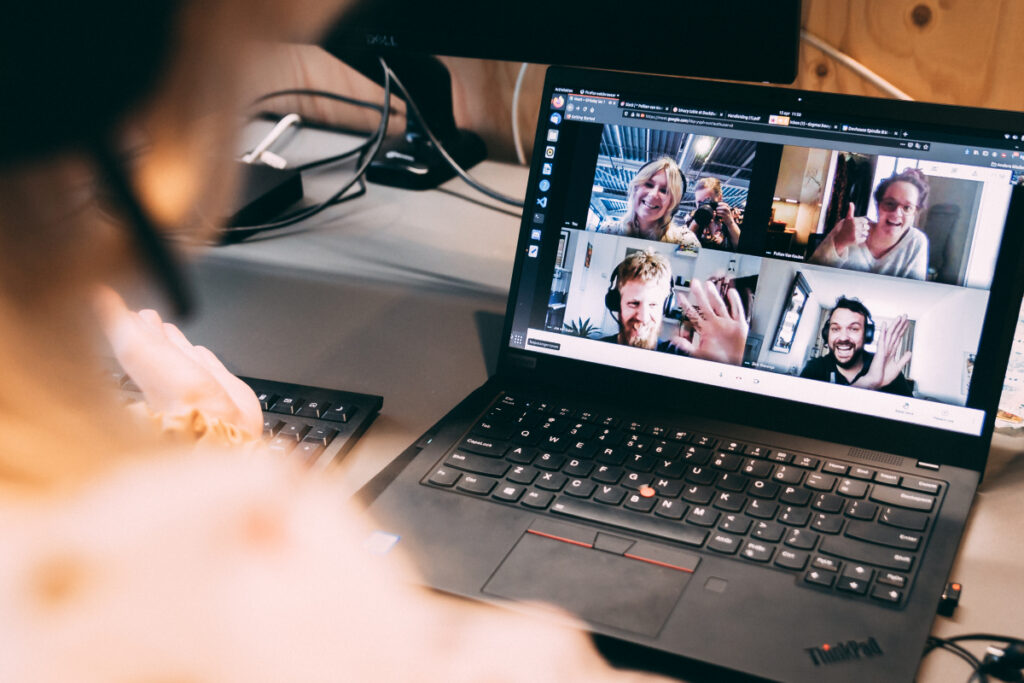The importance of focusing on mental health in the era of remote working
Written by Rianne Schenkel on 15th October 2021
As an HR professional working as part of a self-steering organization, my job has the same goal as an HR professional in a traditional company: to be the bridge between the employer and the employees. However, sometimes how we execute that role is different when you work in an organization without managers. Then when you add in a global pandemic and a sudden switch to remote working, suddenly everything has changed. Over the past year I have had to change the way I am able to support my colleagues. In this blog post I will share how things have changed and give tips for supporting colleagues when working remotely, especially in regards to mental health.
The sudden transition to remote work
I still remember vividly the night everything changed. I watched the press conference where the lockdown in the Netherlands was announced together with my family. The realization that my daughters wouldn’t be able to go to school or activities, or see their friends and family, hit them hard. I was worried about how my husband and I would both balance working and being teachers, all under one roof. But the one thing I didn’t panic about was working from home.
Why? Because hybrid working wasn’t a foreign thing to us as an organization. True, we didn’t do it all the time, but we had the hardware at home. So flipping open my laptop and working through Slack, meetings, administrative tasks etcetera was a piece of cake. At that moment, however, we had no idea how long-lasting this ordeal would be, and how big of an effect it would have.
Being at the office has a large effect
When your job is to work with people and make sure everyone is able to work, actually being with them in the same building makes it a million times easier. Situations like small talk at the coffee machine, having lunch together, or going for a walk during the lunch break creates multiple opportunities to start a conversation with a colleague you normally wouldn’t talk to without a real reason.
Seeing them walk through the office would give me a sense of how someone is doing. Do they chat with colleagues, is someone skipping lunch or are there changes in their behaviour? These are all small signs that they are dealing with something that could affect their health and their work or that they might just need someone to listen. And during a normal working situation, I could assess that by just sitting at my desk, looking around me.
Why is this important? These moments create an opportunity for colleagues to talk about stuff they are dealing with or worry about. Although the whole organization knows that my job, and the job of our HR department which we call the People circle, is to help people navigate hard situations that relate to their health, most times, colleagues may find making an appointment to talk about difficult or negative topics challenging. It could be that just having the opportunity to casually talk about what is going on with someone is enough. Another factor to consider is that some colleagues are more introverted and more reserved towards the outside world.
Being there for my colleagues
In our pre-pandemic working lives, it was normal to spend just as much or even more time with our colleagues than with our families. So, the fact that you can’t go to work and interact throughout the day with your work family has a big impact on your social life. In many situations, especially with colleagues who live alone, loneliness that wasn’t there before set in pretty fast.
Now picture me sitting at my desk at home, where, just like every other working professional, everything I do, see or hear is through online meetings or Slack chats. Suddenly all of those triggers I used to know when I needed to support my colleagues were gone. How do I know that my colleague is having a hard time adjusting to, let’s say, working from home, if they don’t get in touch? I don’t. And that was and still is the biggest problem: not being able to notice the small, yet very important, changes.

How we focused on mental health
Mental health has been on our radar as something that we should address from our roles as HR in the organization for a long time, and we have been working on it even pre-pandemic. However the pandemic showed us that mental health more than ever was something we needed to focus on and come up with tools that could support this.
All of this meant that we could no longer rely on what we used to do, but rather find a new and more active way to perform our HR jobs. Sounds easy enough, right? How do you know what will work and what doesn’t? Only by introducing new ideas and trying them out. That’s exactly what we did.
New ideas for a healthy remote work environment
These are some of the ideas that were introduced:
- Walk-in hour – Each week, myself and a colleague were available on a certain day or time in an online meeting room. Colleagues could join without making an appointment and talk to us about any issues they had or whatever was on their minds.
- Tuesday tips – Each week we shared a different health-related tip through Slack. Some examples of these tips were how to set up your desk properly and apps for yoga, exercising, and mental health.
- Active online presence – Multiple colleagues from our People circle made it a point to regularly send supportive messages in Slack reminding the rest of the organization that the COVID situation and lockdowns are an abnormal and tough situation, and that it’s okay to be struggling. We tried to be an example of how even though Slack can’t replace in-person conversations, there still was a place to talk to your colleagues.
- Health app – We created a company account on a health app for all colleagues to join. This app helped with creating new habits, focusing on mindfulness, guiding workouts, and more. By doing this, we showed the organization that focusing on your physical and mental health was even more important now than ever before.
- Extra time off – During the lockdowns, because taking a vacation wasn’t possible, a lot of colleagues postponed using their vacation time until travel was possible again. While this was understandable, colleagues were missing the mental break from work that is necessary to keep yourself rested and healthy. To promote people taking time off, even if they couldn’t travel, we gave all colleagues twelve extra hours off, in the form of three half-days. A colleague could take a day off but only use four of their vacation hours, and we would match the other four. This way we all had a break, but could also save some time for when travel and vacations were possible again.
Each time we tried something new, we watched to see what our colleagues responded positively to, which meant we should continue doing this in the future. We also tried to do things that made people smile, like for instance I shared my kids’ favorite recipe for creating slime which spurred a fun debate about which parents encourage or discourage their kids to make it and other messy projects. Even though this wasn’t directly related to mental health or work, it helped people remember that we are all in this together, and there are other people in similar situations you can talk to.
Continuing to adapt
These tips may look simple, and they are. The important thing about whatever you try is making people aware of the fact that everyone is seen and heard. For us, that was what helped when trying to keep a healthy work environment where it is safe to reach out or ask for help.
Of course these solutions don’t solve every issue or cover each situation. But for us, these steps have made a difference and have had a positive effect. Still, it will be a process that will keep evolving along the way. Even after the world has gone back to how it was before, well mostly. The way of working will never be as it was, I like to think it will make it better.
Let us know your thoughts
If you have questions after reading this about how we are handling mental health in our work environment, or have tips for us that worked for your organization, please reach out to us in the comments or on social media. We’d love to hear from you!




Your thoughts
No comments so far